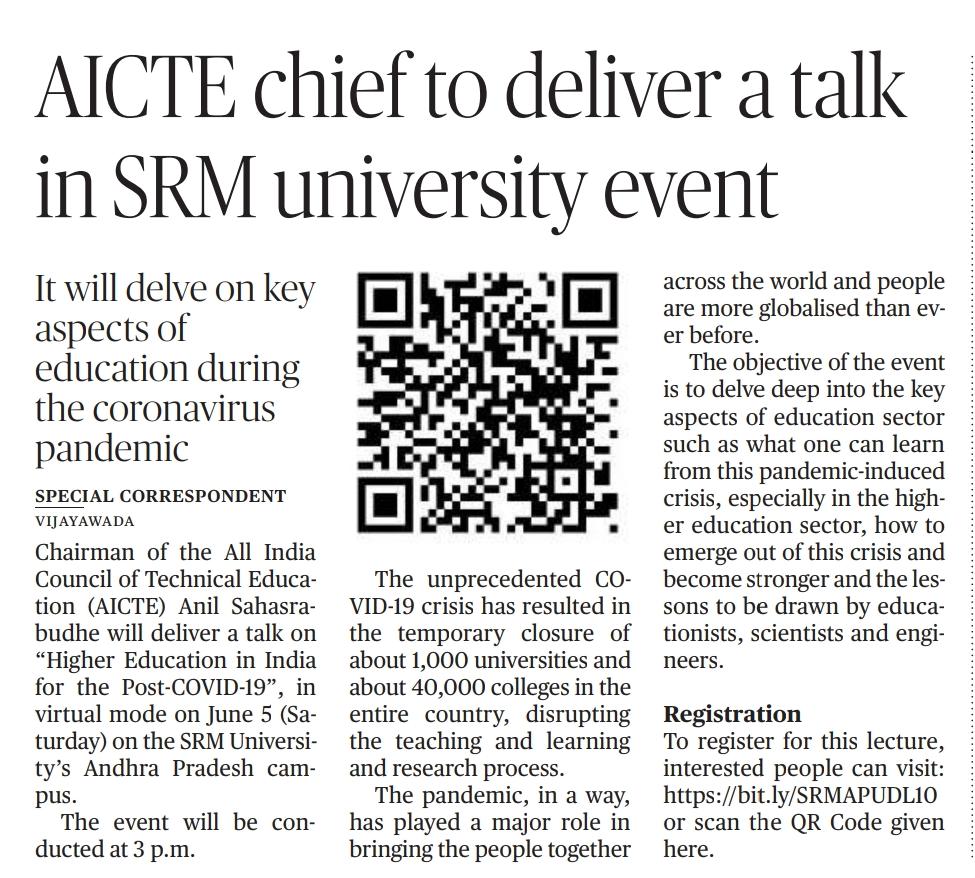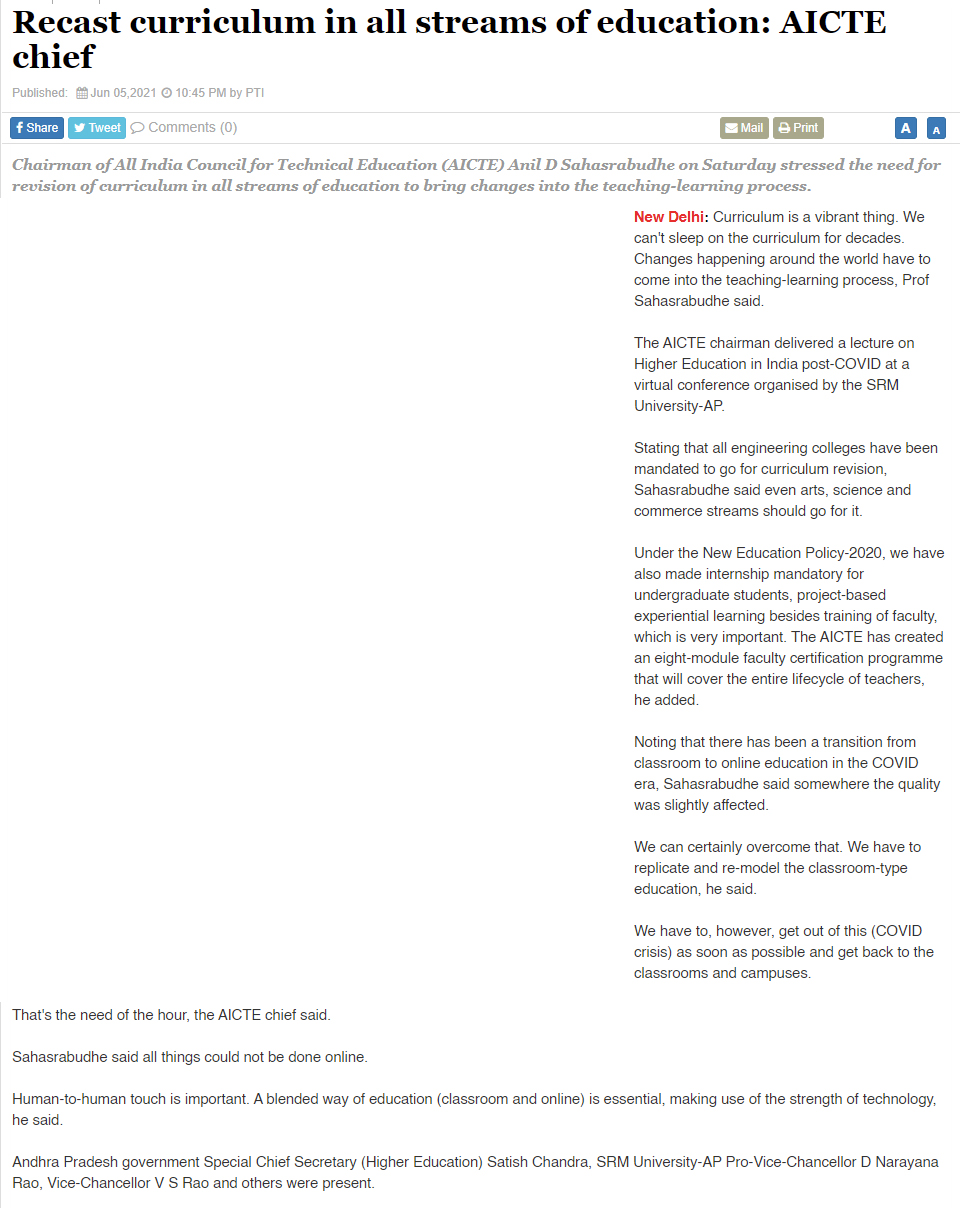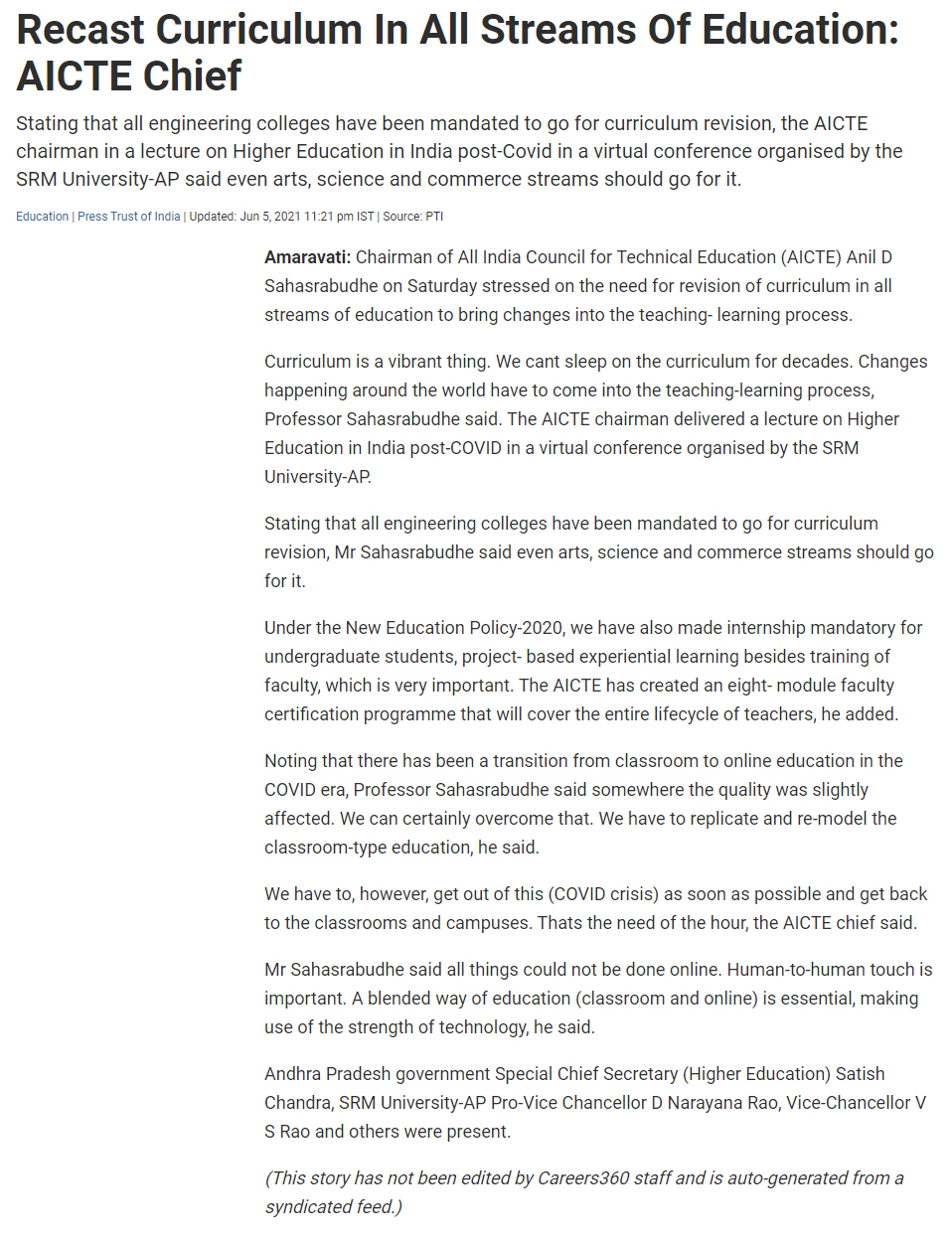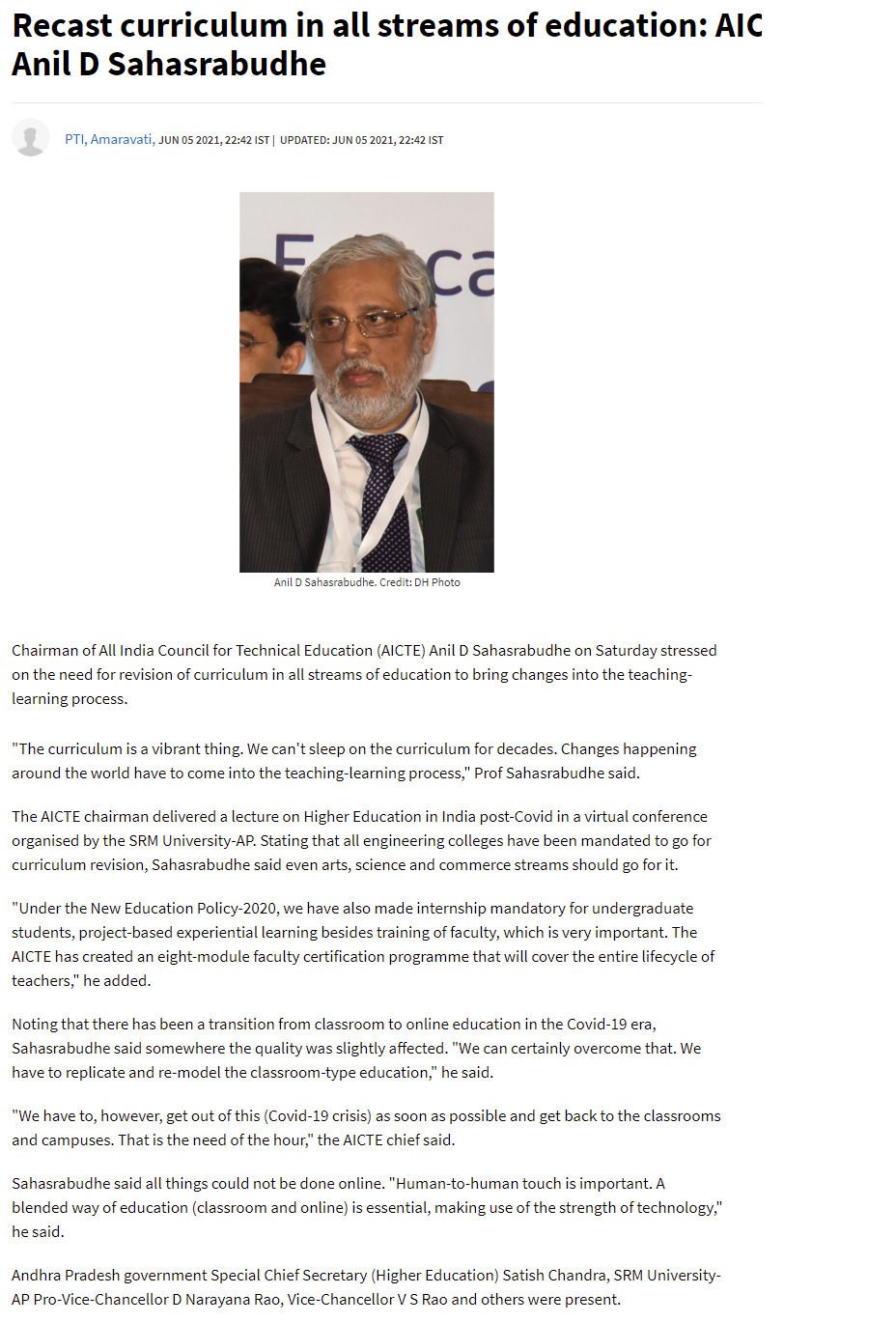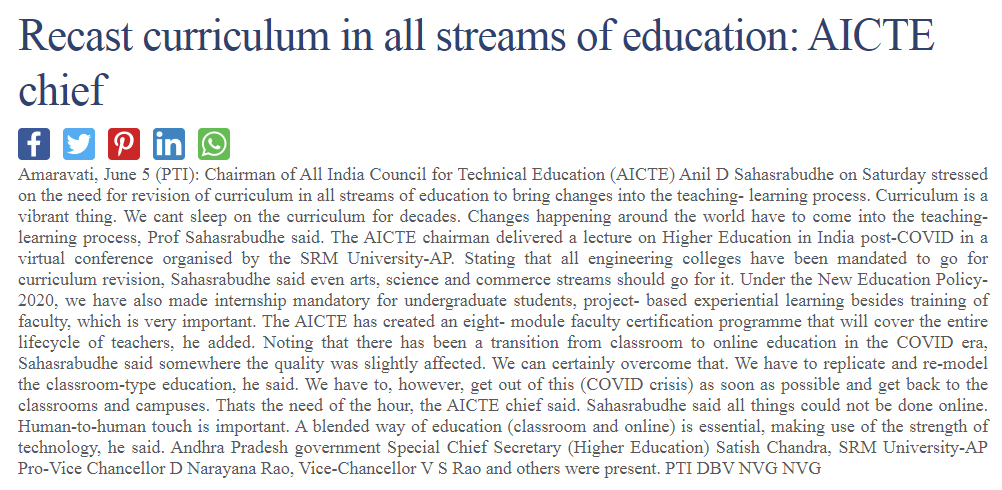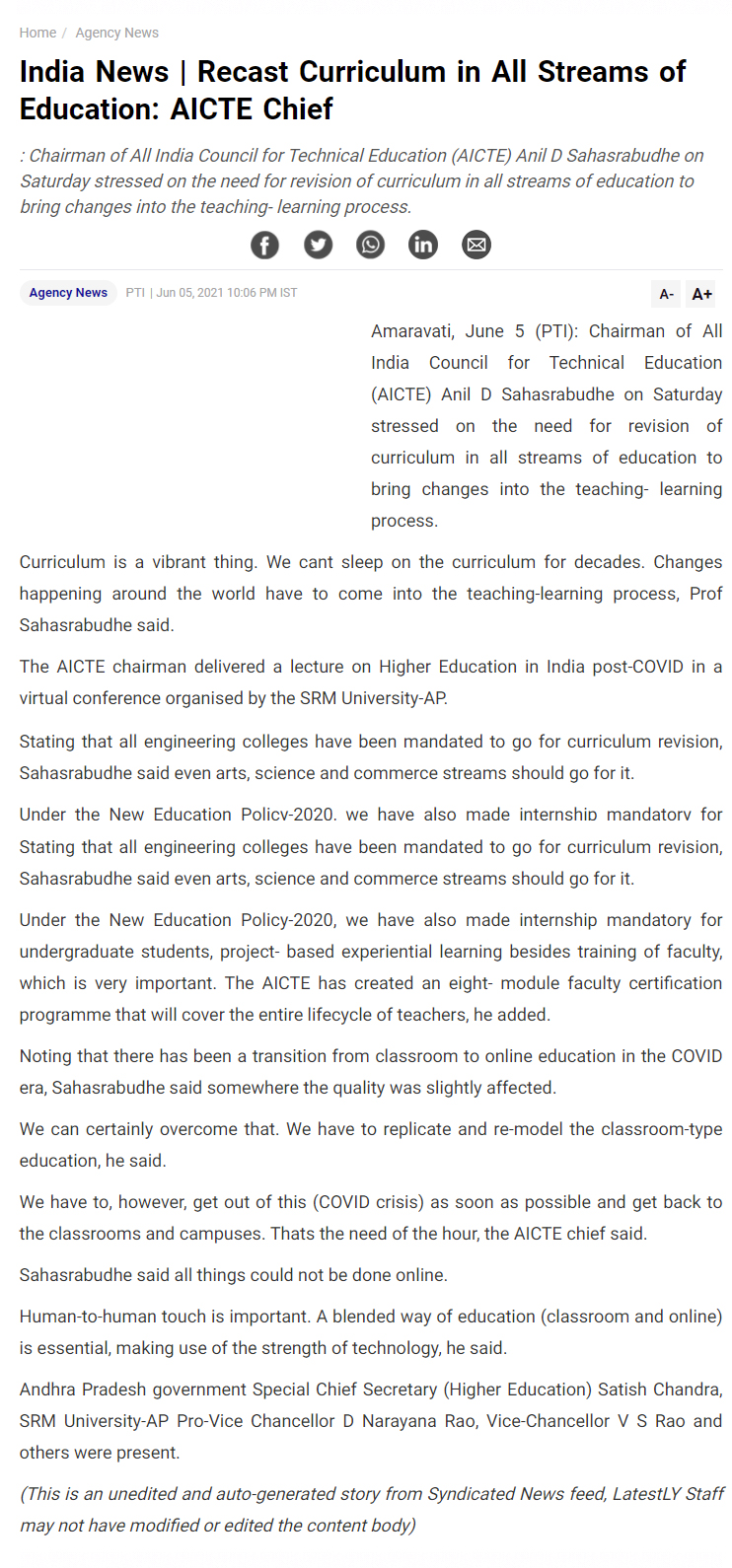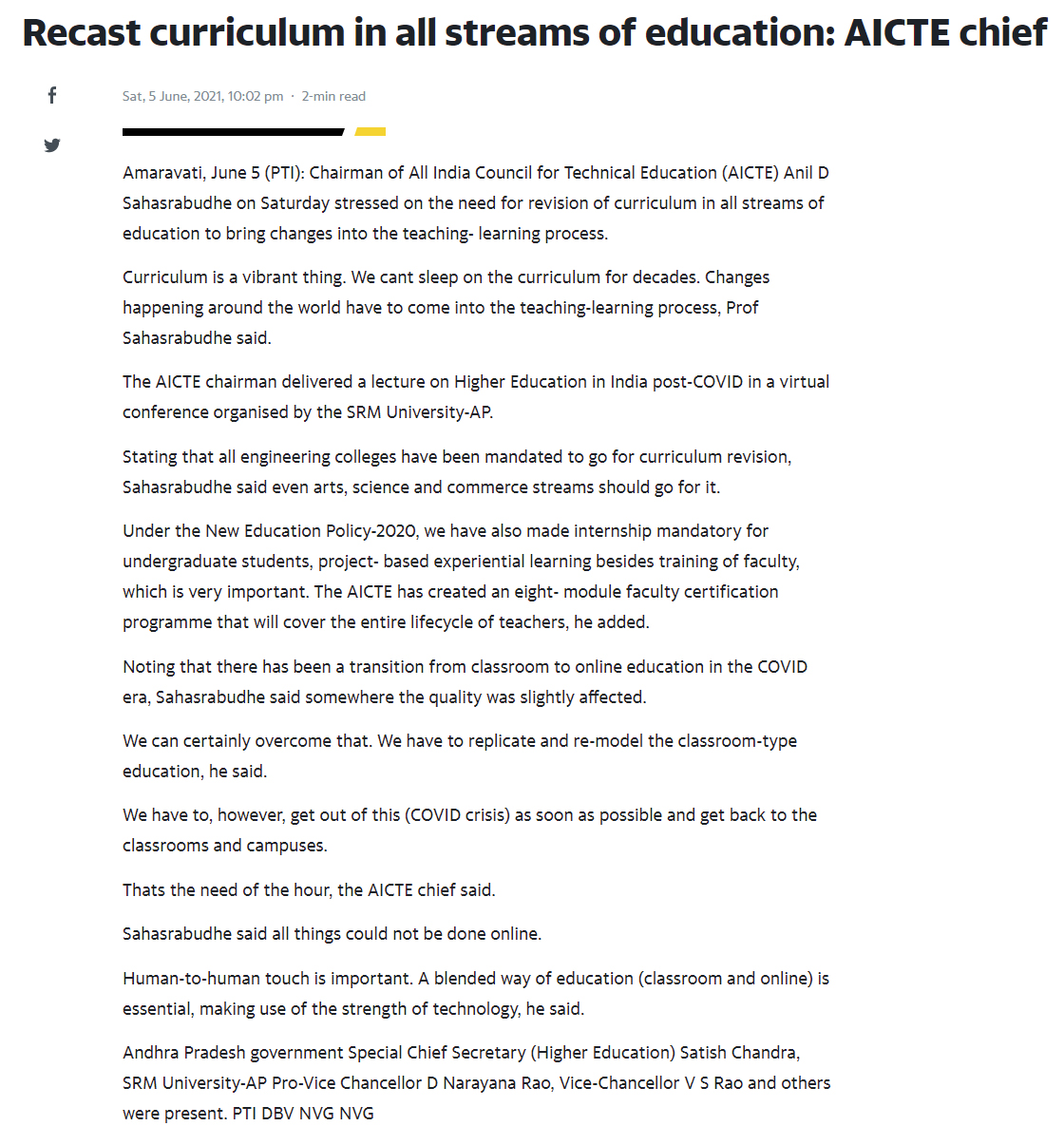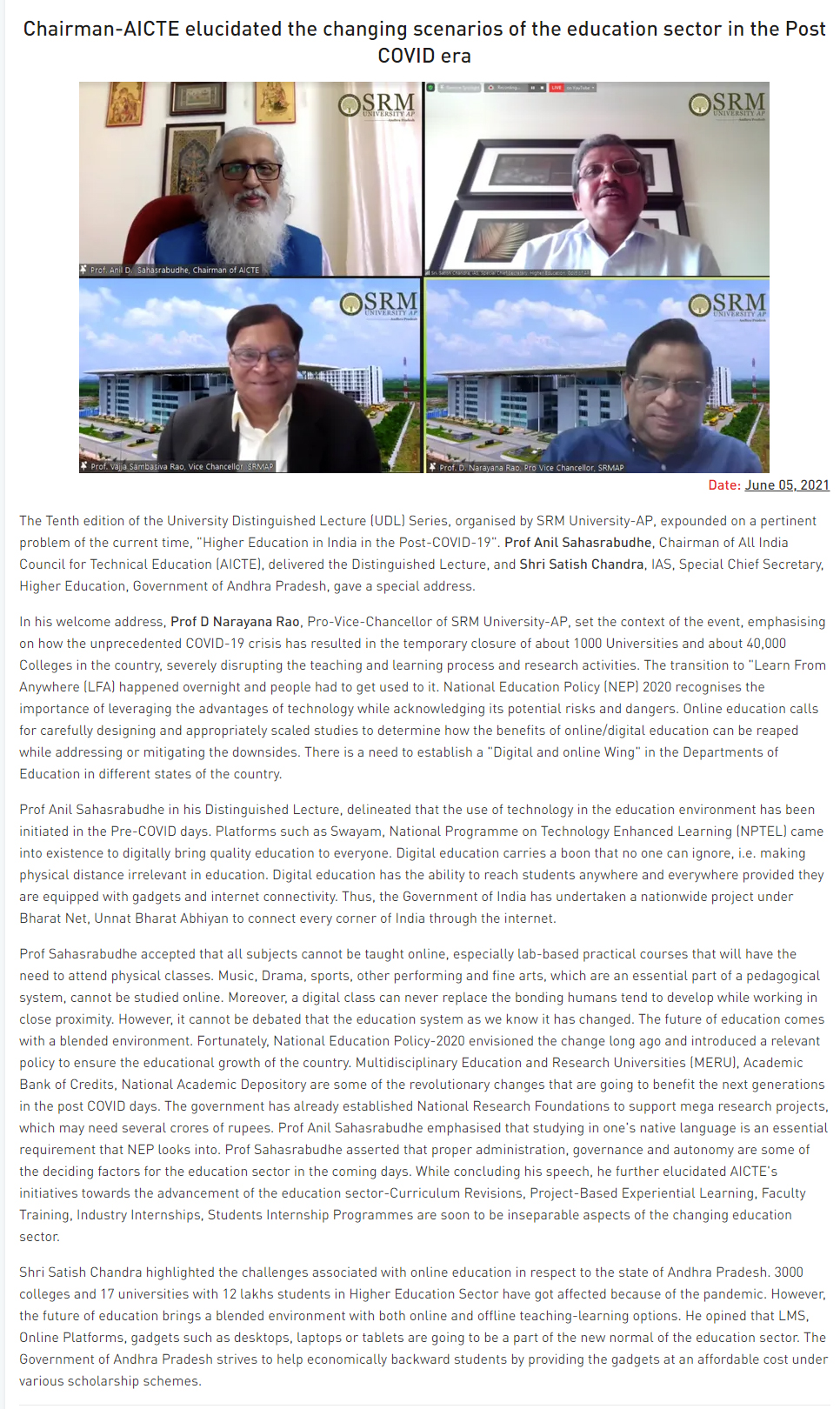All Management News
- Chairman-AICTE elucidated the changing scenarios of the education sector in the Post COVID era June 8, 2021
The Hindu Vijayawada – June 05
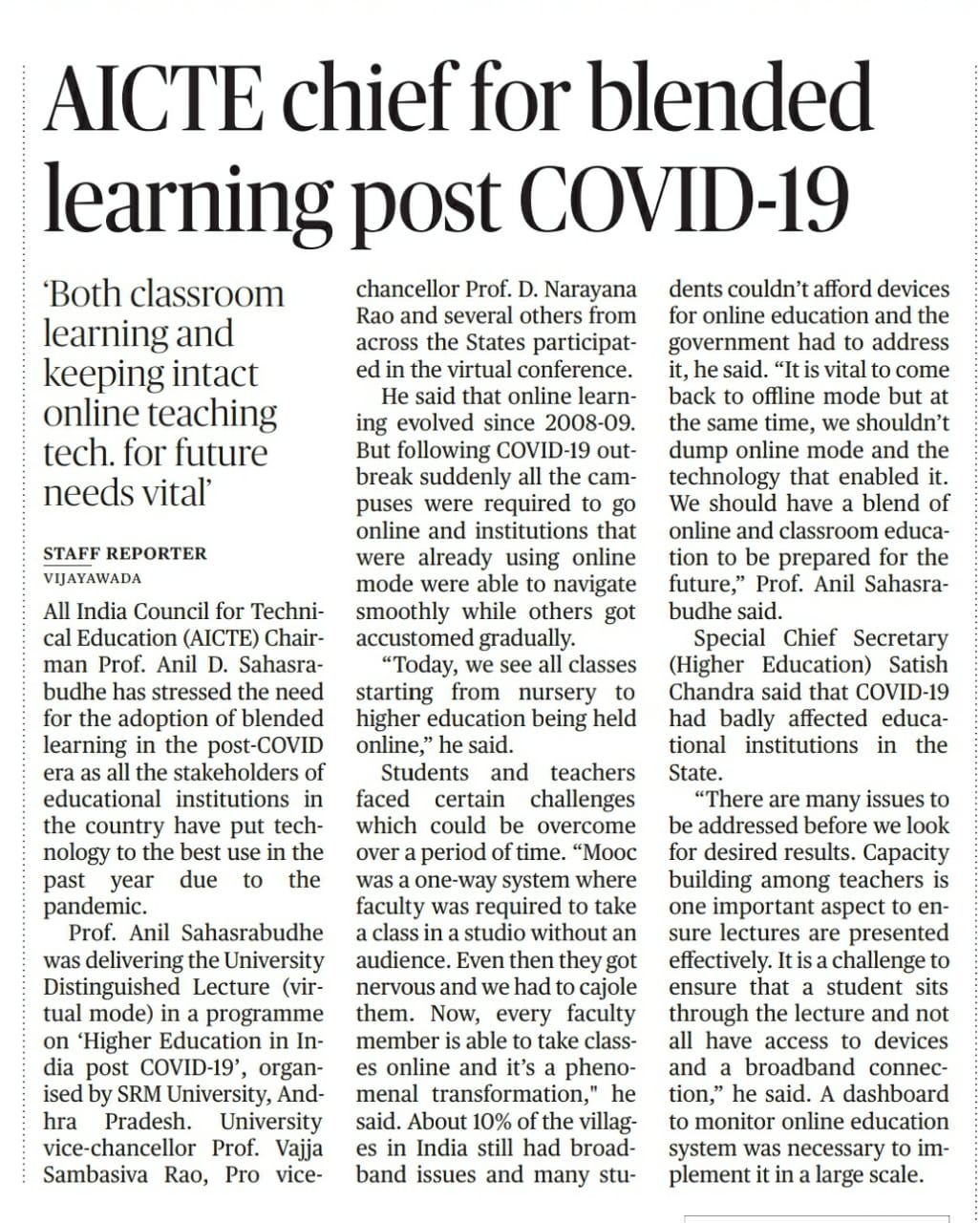
Deccan Chronicle – June 05
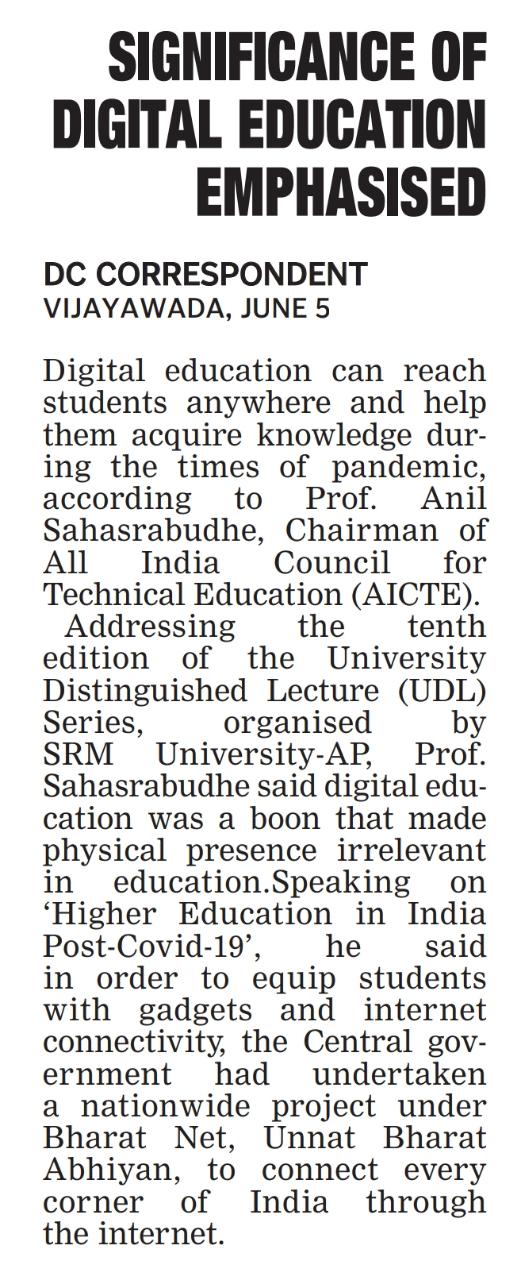
United News of India – June 05
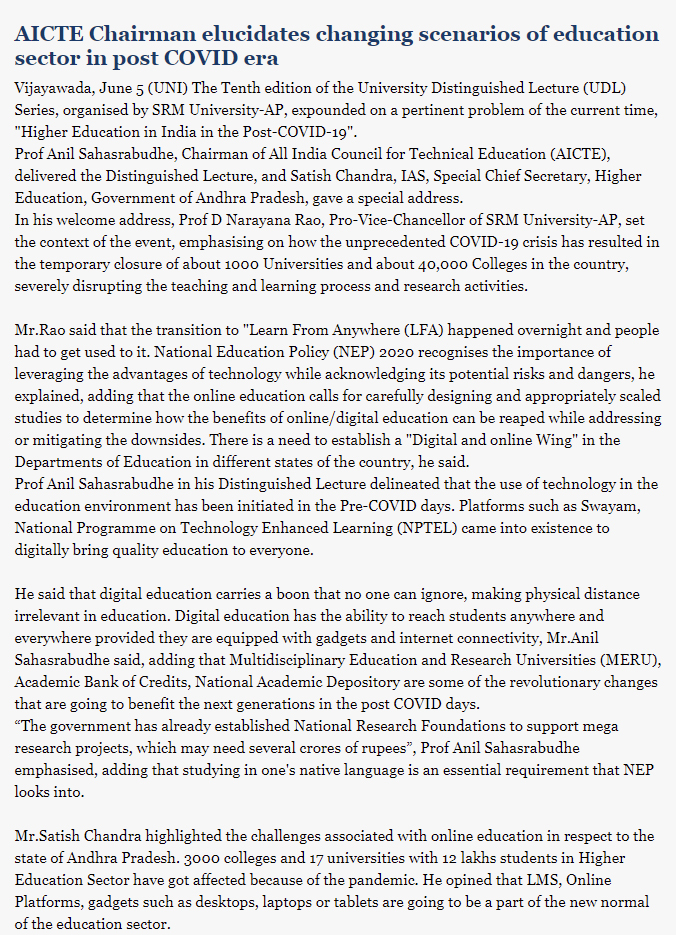
Business World Education – June 05
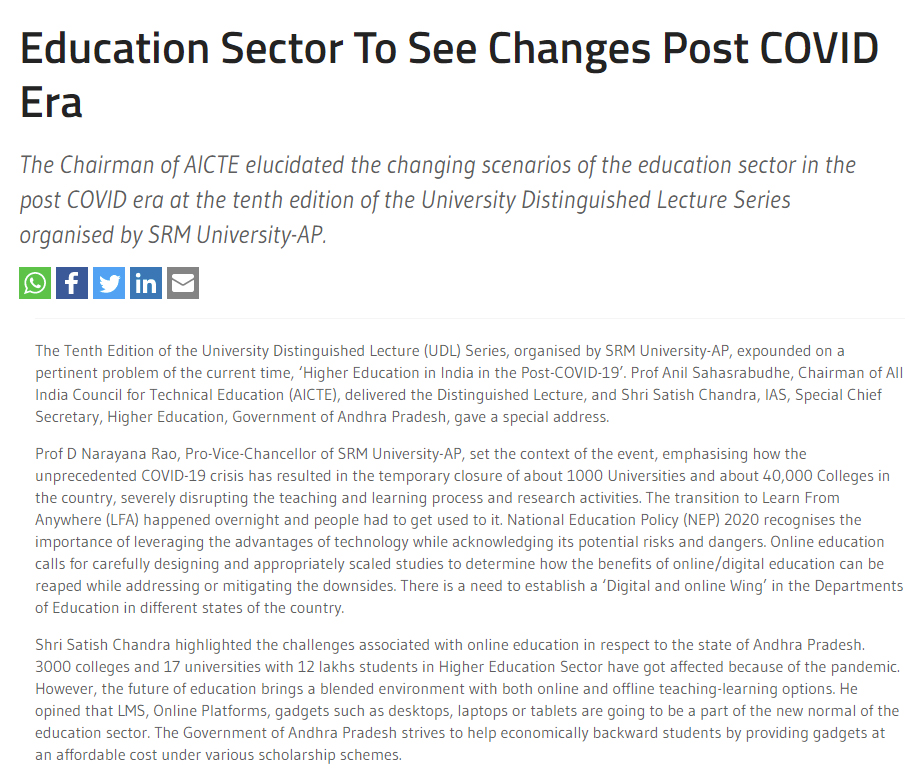
India Education Diary – June 05
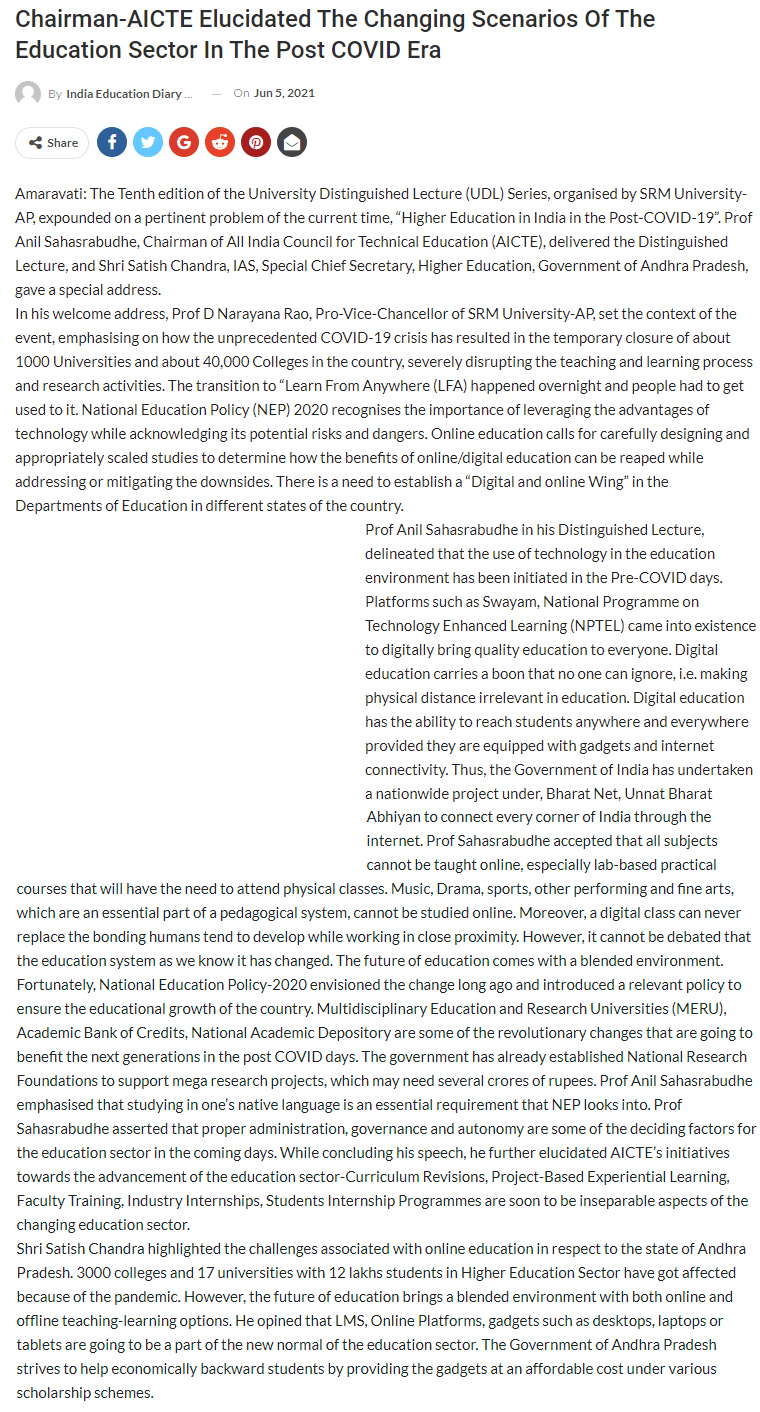
Daily Pioneer – June 05
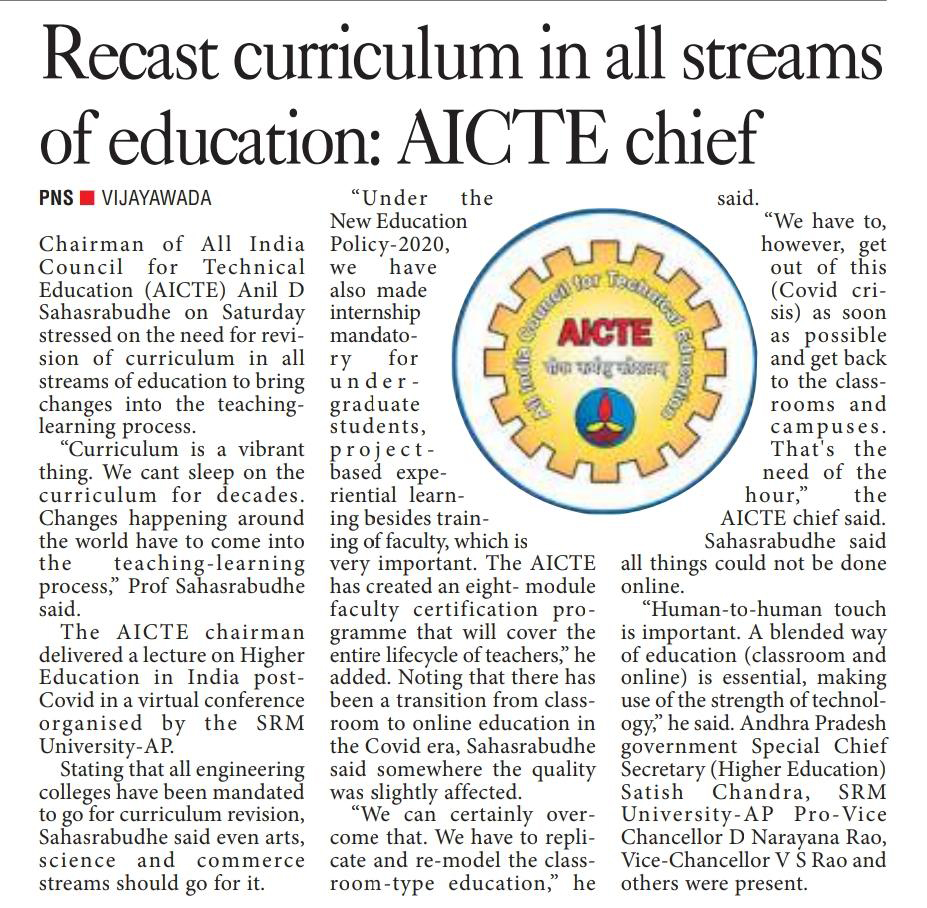
Eenadu – June 05
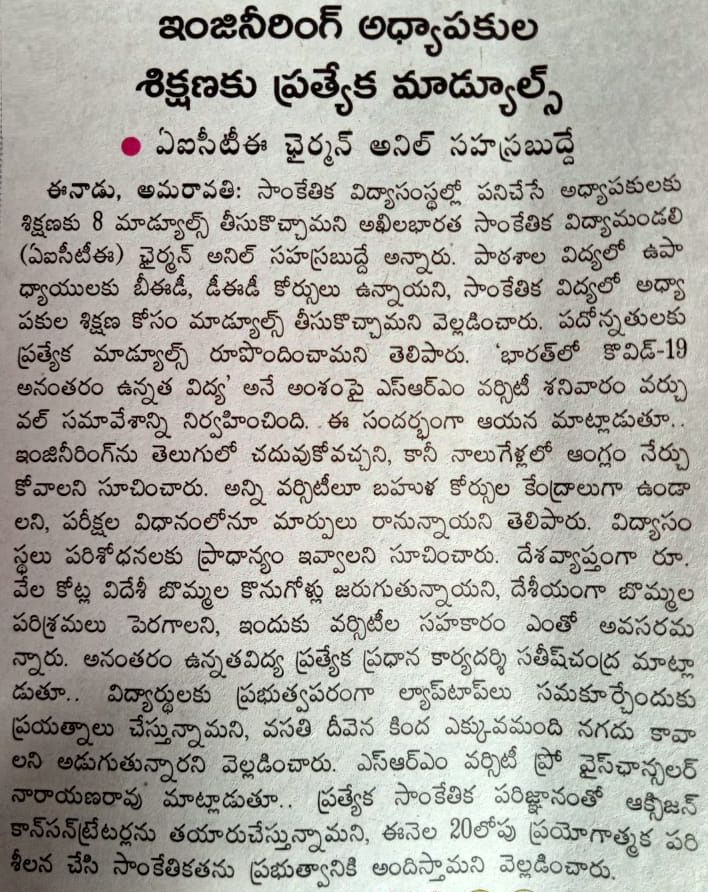
Sakshi – June 05
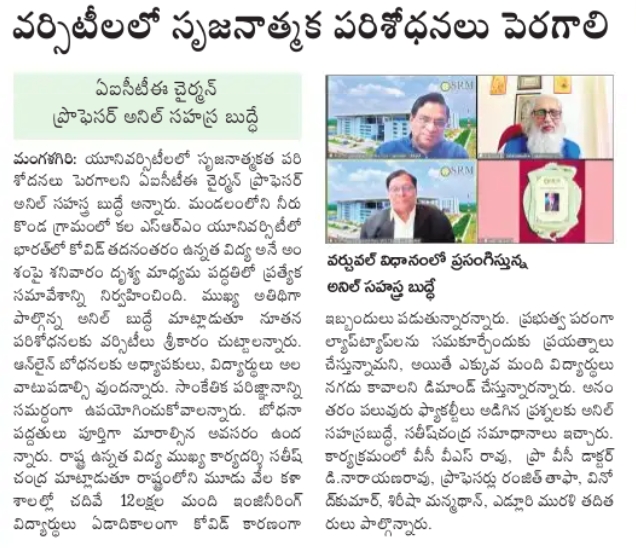
Surya – June 05
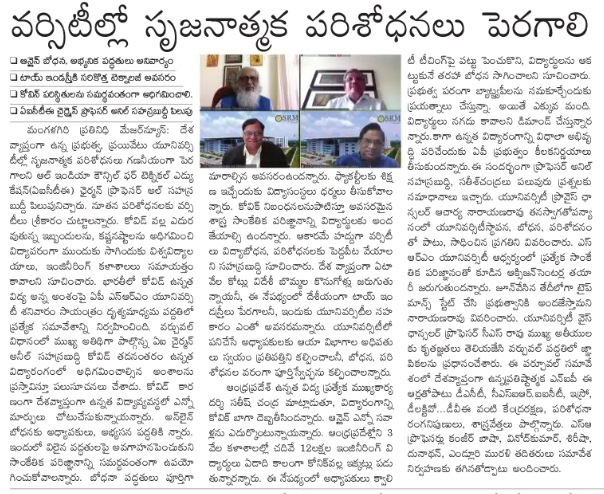
Vaartha – June 05
Continue reading →
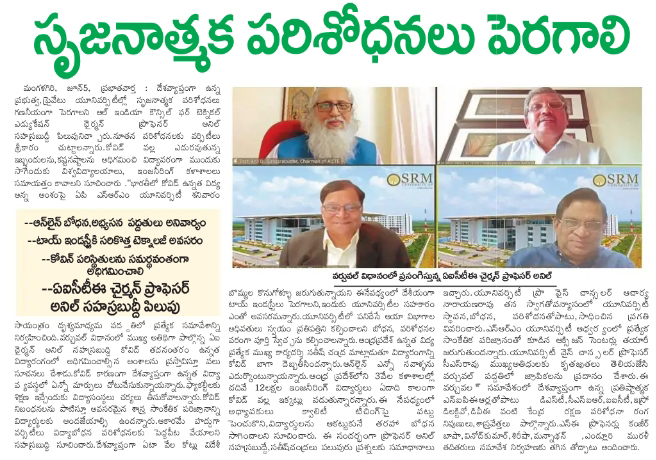
- Chairman-AICTE elucidated the changing scenarios of the education sector in the Post COVID era June 6, 2021
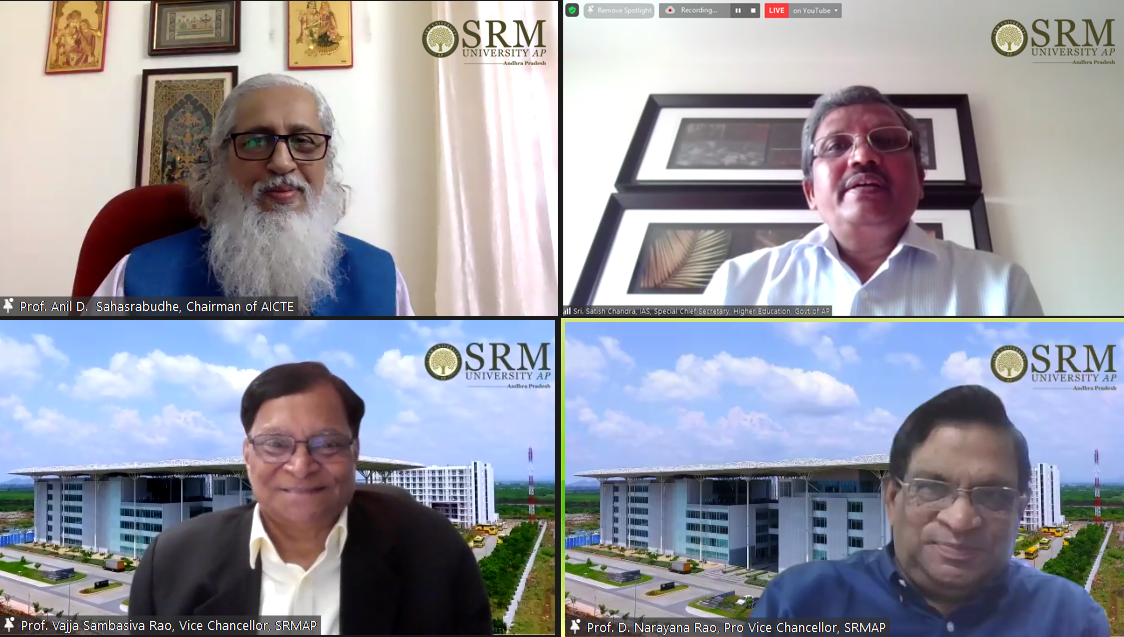
The Tenth edition of the University Distinguished Lecture (UDL) Series, organised by SRM University-AP, expounded on a pertinent problem of the current time, “Higher Education in India in the Post-COVID-19”. Prof Anil Sahasrabudhe, Chairman of All India Council for Technical Education (AICTE), delivered the Distinguished Lecture, and Shri Satish Chandra, IAS, Special Chief Secretary, Higher Education, Government of Andhra Pradesh, gave a special address.In his welcome address, Prof D Narayana Rao, Pro-Vice-Chancellor of SRM University-AP, set the context of the event, emphasising on how the unprecedented COVID-19 crisis has resulted in the temporary closure of about 1000 Universities and about 40,000 Colleges in the country, severely disrupting the teaching and learning process and research activities. The transition to “Learn From Anywhere (LFA) happened overnight and people had to get used to it. National Education Policy (NEP) 2020 recognises the importance of leveraging the advantages of technology while acknowledging its potential risks and dangers. Online education calls for carefully designing and appropriately scaled studies to determine how the benefits of online/digital education can be reaped while addressing or mitigating the downsides. There is a need to establish a “Digital and online Wing” in the Departments of Education in different states of the country.
Prof Anil Sahasrabudhe in his Distinguished Lecture, delineated that the use of technology in the education environment has been initiated in the Pre-COVID days. Platforms such as Swayam, National Programme on Technology Enhanced Learning (NPTEL) came into existence to digitally bring quality education to everyone. Digital education carries a boon that no one can ignore, i.e. making physical distance irrelevant in education. Digital education has the ability to reach students anywhere and everywhere provided they are equipped with gadgets and internet connectivity. Thus, the Government of India has undertaken a nationwide project under, Bharat Net, Unnat Bharat Abhiyan to connect every corner of India through the internet. Prof Sahasrabudhe accepted that all subjects cannot be taught online, especially lab-based practical courses that will have the need to attend physical classes. Music, Drama, sports, other performing and fine arts, which are an essential part of a pedagogical system, cannot be studied online. Moreover, a digital class can never replace the bonding humans tend to develop while working in close proximity. However, it cannot be debated that the education system as we know it has changed. The future of education comes with a blended environment. Fortunately, National Education Policy-2020 envisioned the change long ago and introduced a relevant policy to ensure the educational growth of the country. Multidisciplinary Education and Research Universities (MERU), Academic Bank of Credits, National Academic Depository are some of the revolutionary changes that are going to benefit the next generations in the post COVID days. The government has already established National Research Foundations to support mega research projects, which may need several crores of rupees. Prof Anil Sahasrabudhe emphasised that studying in one’s native language is an essential requirement that NEP looks into. Prof Sahasrabudhe asserted that proper administration, governance and autonomy are some of the deciding factors for the education sector in the coming days. While concluding his speech, he further elucidated AICTE’s initiatives towards the advancement of the education sector-Curriculum Revisions, Project-Based Experiential Learning, Faculty Training, Industry Internships, Students Internship Programmes are soon to be inseparable aspects of the changing education sector.
Shri Satish Chandra highlighted the challenges associated with online education in respect to the state of Andhra Pradesh. 3000 colleges and 17 universities with 12 lakhs students in Higher Education Sector have got affected because of the pandemic. However, the future of education brings a blended environment with both online and offline teaching-learning options. He opined that LMS, Online Platforms, gadgets such as desktops, laptops or tablets are going to be a part of the new normal of the education sector. The Government of Andhra Pradesh strives to help economically backward students by providing the gadgets at an affordable cost under various scholarship schemes.
Continue reading → - Talk to your Doctor- Session for Students,staff and Faculty June 5, 2021
 Health and Fitness are the most significant aspects of our lives. These are the two “known “terms going hand in hand. Regular consultations with trusted and experienced medical experts are necessary when health is a concerning factor amid the COVID-19 Pandemic. SRM University-AP steps forward to offer an avenue for its students, staff and faculty members to discuss their health-related issues. It is a free online medical consultation programme that will take place every Saturday. Distinguished medical officers of the institute Dr Lakshmi Rajyam and Dr Lakshmi Kiran Talluri, would address the session.
Health and Fitness are the most significant aspects of our lives. These are the two “known “terms going hand in hand. Regular consultations with trusted and experienced medical experts are necessary when health is a concerning factor amid the COVID-19 Pandemic. SRM University-AP steps forward to offer an avenue for its students, staff and faculty members to discuss their health-related issues. It is a free online medical consultation programme that will take place every Saturday. Distinguished medical officers of the institute Dr Lakshmi Rajyam and Dr Lakshmi Kiran Talluri, would address the session.In this scenario where individuals are more prone to get infected by a fatal disease, people must clarify all health-related questions on symptoms, causes and treatment. The one-hour long consultation session would be a valuable platform for getting responses on health-related issues and bursting the myth regarding diseases. Due to COVID-19, when people are not inclined to visit the clinics and hospitals, they can obtain detailed information on their queries through online consultation with these medical experts.
Dr Lakshmi Rajyam is a distinguished personality serving the medical science fraternity for over 42 years and is currently associated with SRM University-AP as the Chief Medical Officer. She has vast experience working with reputed hospitals in the country and can enlighten the participants on testing, treatment, and medication. Since 2017, Dr Rajyam has been an integral part of the SRM Group and is looking after the health and welfare of the University associates in challenging times.
Dr Lakshmi Kiran Talluri is the young mind in the medical team of SRM University-AP. He has completed his MBBS from the NRI College of Medical, Guntur, Andhra Pradesh, and has pledged to render the best services to the community.
With the growing stress in life, people are succumbed to fatal diseases and face an early death—the only way to prevent fatality is the diagnosis and proper medication. Here the medical experts can enrich the participants with the necessary knowledge. The faculty, staff and students of the University are requested to join the session on June 05, 2021 at 6 pm to satisfy their queries
Continue reading → - Reimagine, Recreate, Restore: World Environment Day Quiz June 5, 2021
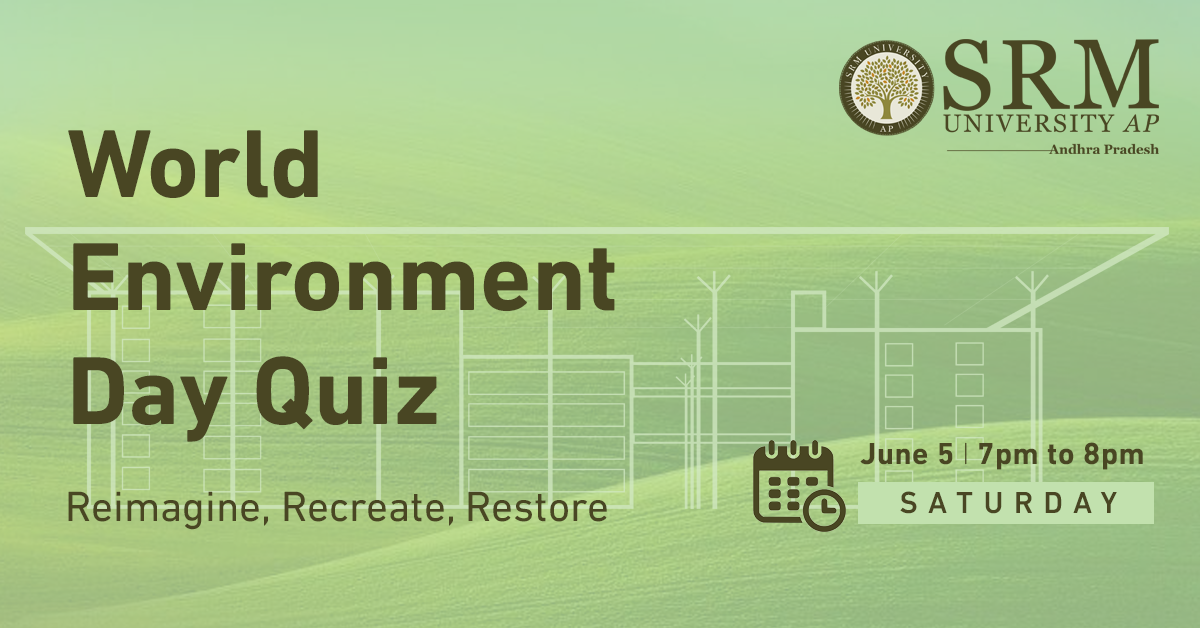 Sustainable development that curbs pollution and thus prevents the extinction of species from the surface of the earth is the urgent need of the hour. The United Nations Assembly established World Environment Day in 1972 to fundamentally raise awareness among people about the importance of ecosystem preservation. Since then, World Environment Day is observed on June 5 annually with eco-sensitive themes to remind individuals and organisations about their duties and responsibilities towards the gift of nature.
Sustainable development that curbs pollution and thus prevents the extinction of species from the surface of the earth is the urgent need of the hour. The United Nations Assembly established World Environment Day in 1972 to fundamentally raise awareness among people about the importance of ecosystem preservation. Since then, World Environment Day is observed on June 5 annually with eco-sensitive themes to remind individuals and organisations about their duties and responsibilities towards the gift of nature.This year’s theme: ‘Reimagine.Recreate.Restore.’ marks the beginning of the United Nations Decade on Ecosystem Restoration. The Department of Student Affairs, SRM University-AP is organizing a Quiz Programme for the students on June 5, 2021, at 7:00 pm to ensure commitment to the earth’s reviving mission, as a green and sustainable university.
“Nature is healing” is a misleading message that has been circulated in the digital world during these Covid-19 pandemic days when human activities are shut down around the world. It is not just a year or a decade since humans have started exploiting, looting, and destroying the wildlife, coral reefs, deserts, mountains and more. Let us be a generation that reimagines creative ways to restore our natural resources.
All are welcome!
Continue reading → - Department of Economics organised an International conclave of Agricultural Sustainability June 4, 2021
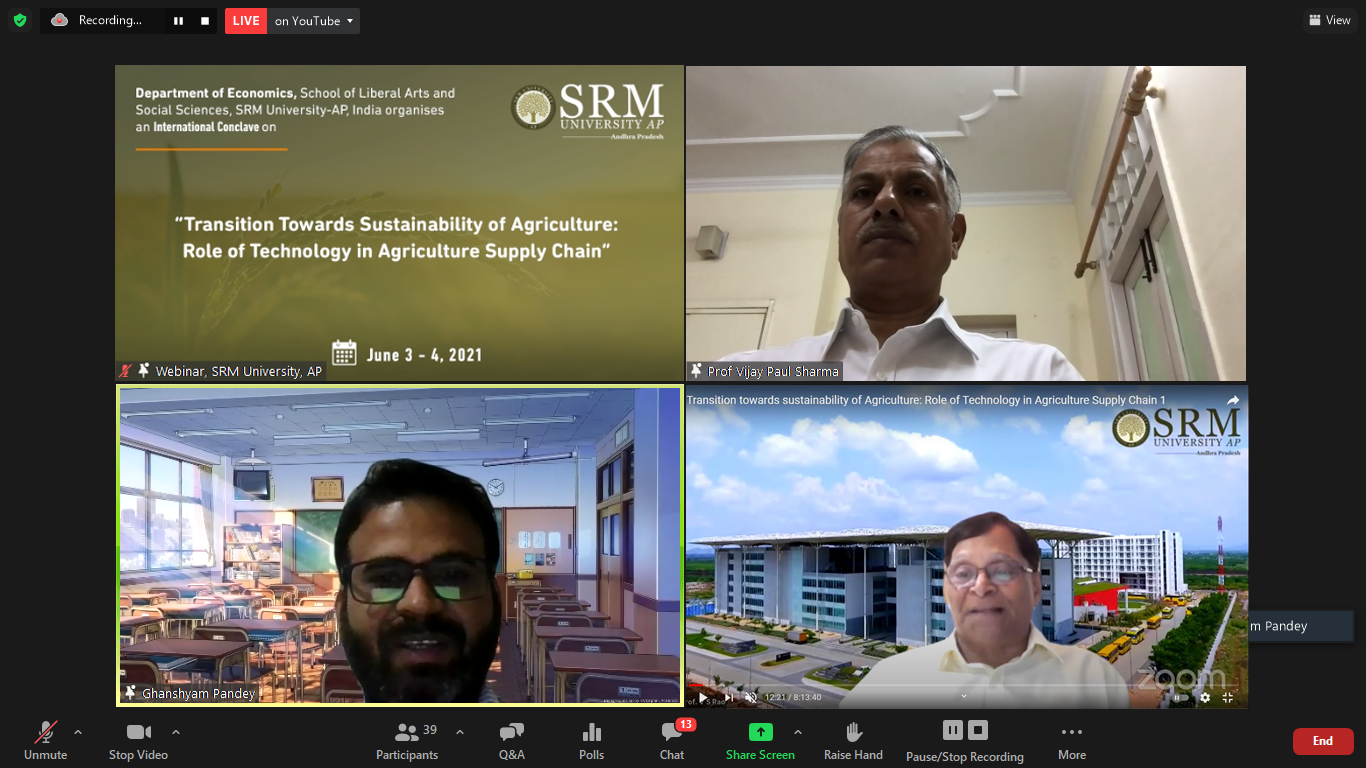 Department of Economics, SRM University-AP organised the International Conclave on “Transition towards sustainability of Agriculture: Role of Technology in Agriculture Supply Chain” on June 3-4th, 2021. Prof Vijay Paul Sharma, Chairman, Commission for Agriculture Costs and Price (CACP), Ministry of Agriculture & Farmer Welfare, GoI, India, was the chief guest of the event. The tope agricultural economist from India and abroad from the reputed institutions, i.e., Arizona State University, USA; Bangabandhu Sheikh Mujibur Rahman Agricultural University, Bangladesh; ICAR-NIAP; IFPRI South Asia Office Delhi; JNU, IIMA, IIMB, IGIDR Mumbai, Delhi School of Economics; Institute of Economic Growth; Symbiosis School of Economics, Pune; Central University of Punjab; Central University of Jammu; Sharda University, Noida; Amity University, Noida; PAU, Ludhiana; AN Sinha Institute of Social Sciences, Patna; Centre for Development Studies; Thrivanthapuram delivered lectures and participated in Panel Discussions in the two-day event.
Department of Economics, SRM University-AP organised the International Conclave on “Transition towards sustainability of Agriculture: Role of Technology in Agriculture Supply Chain” on June 3-4th, 2021. Prof Vijay Paul Sharma, Chairman, Commission for Agriculture Costs and Price (CACP), Ministry of Agriculture & Farmer Welfare, GoI, India, was the chief guest of the event. The tope agricultural economist from India and abroad from the reputed institutions, i.e., Arizona State University, USA; Bangabandhu Sheikh Mujibur Rahman Agricultural University, Bangladesh; ICAR-NIAP; IFPRI South Asia Office Delhi; JNU, IIMA, IIMB, IGIDR Mumbai, Delhi School of Economics; Institute of Economic Growth; Symbiosis School of Economics, Pune; Central University of Punjab; Central University of Jammu; Sharda University, Noida; Amity University, Noida; PAU, Ludhiana; AN Sinha Institute of Social Sciences, Patna; Centre for Development Studies; Thrivanthapuram delivered lectures and participated in Panel Discussions in the two-day event. The event started with the welcome address of Dr Ghanshyam Pandey, Assistant Professor and Head of the Department of Economics and the opening remarks were delivered by Prof V S Rao, Vice-Chancellor, SRM University-AP.
“The agriculture and food sector are facing multiple challenges. With the global population projected to grow from 7.6 billion in 2018 to over 9.6 billion in 2050, there will be a significant increase in the demand for food. At the same time, the availability of natural resources such as fresh water and productive arable land is becoming increasingly constrained. Production is not the only concern; although agricultural output is currently enough to feed the world, 821 million people still suffer from hunger. Processes such as the rapid rate of urbanisation also have important implications for food production patterns and consumption patterns. This will require an urgent transformation of the current agri-food system. Digital innovations and technologies may be part of the solution. In the agriculture and food sector, the spread of mobile technologies, remote-sensing services, and distributed computing are already improving smallholders’ access to information, inputs, market, finance, and training. Digital technologies are creating new opportunities to integrate smallholders into a digitally-driven agri-food system,” said Prof Rao.
In the first Keynote speech of the conclave Prof Vijay Paul Sharma, Chairman, Commission for Agriculture Costs and Price (CACP), Ministry of Agriculture & Farmer Welfare, GoI, India, explained all the aspects of the agriculture sector to achieve sustainable growth. He started with agriculture production shifted from supply-driven to demand-driven, filling the yield gap between the states and moved on to the right kind of government intervention to improve the farmers’ welfare, shortage of labourer and mechanisation, technology, credit infrastructure, public investment, and climate change and variability.
Prof R S Desh Pande, a renowned economist, pointed out that we are at a stagnant point in agriculture, and the sustainability of agriculture would be very challenging. He mentioned that commercialisation (cropping method) and greed are the two major enemies of sustainability. He mentioned that largely we are getting the technology which is cost increasing techniques rather than cost-saving which ultimately leads to the decline of the net income of the farmers from the last two decades.
Advancing into the event, Prof P S Birthal, National Professor, ICAR-NIAP, PUSA Delhi, India, illuminated the audience with his strategic discussion on Agricultural Technologies and Supply Chains for Sustainable Agricultural Development. He discussed that in all revolutions in agriculture and allied activities in India, a common element had been the technology, although it was driven by different agents. He mentioned that technology is a key source for agricultural growth. Investment in research and development has increased but much less than the several developing and developed countries globally. He also mentioned that growth in agricultural markets had not kept pace with growth in agricultural production. Markets are inefficient because of poor infrastructure and communication networks that result in the higher cost of trade to sellers and buyers, along with asymmetric information between them. He has given some suggestions for farmers to benefit from, i.e., doorstep offtake of the produce, access to improve technology, quality inputs, access to credit insurance against market price, and diversification from water-guzzling crops like rice.
Prof Prem Vashistha from Sharda University highlighted the research innovation done by IFCO for liquid urea. A bottle of 5 ml urea is equally effective to one bag of urea, which is economical and reduces the burden of subsidy from the government. He mentioned this kind of revolution we required in all the areas for sustainable agriculture reducing subsidies. He also gave stress on linkages between institutions with the market are very important.
While talking on the role of technologies for sustainable agriculture, Dr Anjani Kumar, a senior fellow from International Food Policy Research Institute, South Asian Office, Delhi, mentioned how research is essential. Dr Kumar indicated that marginal returns to agricultural R&D expenditure are low for high-income states while more for low-income states. His research shows that R&D significantly impacts reducing poverty and inequality. He also mentioned that the seed replacement rate is frequently high in developed states while very low in underdeveloped states.
Almost 20 distinguished panellists and 20 presenters, along with more than 100 participants, attended the event. Dr Ananda Rao Suvvari, Assistant Professor, Department of Economics, SRM University-AP, cordially thanked all the speakers and panellists for their efforts to make the conclave a grand success.
Pre-Event Release: https://srmap.edu.in/events/economics-international-conclave-role-technology-sustainable-agricultural-growth/
Continue reading → - ICMR-NIN Scientist on the Dietary Risk Factors for NCDs June 4, 2021
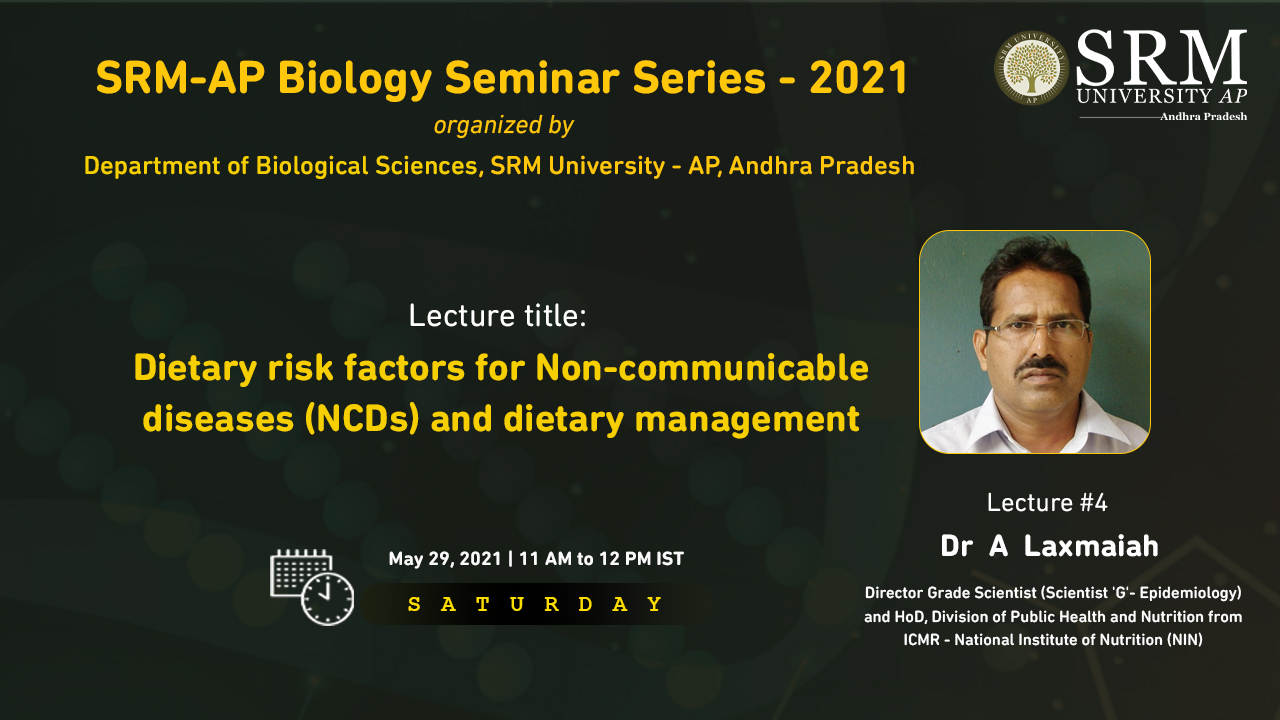 A profound and astute fourth edition of the Biology Seminar Series on the theme “Dietary Risk Factors for Non-communicable Diseases (NCDs) and Dietary Management”, which was held on May 29, 2021, addressed the vital questions on factors contributing to the rise in non-communicable diseases. Dr A Laxmaiah, Director Grade Scientist (Scientist ‘G’- Epidemiology) and HoD, Division of Public Health and Nutrition from ICMR – National Institute of Nutrition (NIN), elucidated on the topic and discussed the role of nutrition in alleviating such risks.
A profound and astute fourth edition of the Biology Seminar Series on the theme “Dietary Risk Factors for Non-communicable Diseases (NCDs) and Dietary Management”, which was held on May 29, 2021, addressed the vital questions on factors contributing to the rise in non-communicable diseases. Dr A Laxmaiah, Director Grade Scientist (Scientist ‘G’- Epidemiology) and HoD, Division of Public Health and Nutrition from ICMR – National Institute of Nutrition (NIN), elucidated on the topic and discussed the role of nutrition in alleviating such risks.Dr Laxmaiah stated that almost 38% of children in India are stunted and over 21% are wasted, which is a very alarming statistic. He also noted that, according to reports, more than 60% of the country’s population suffers from iron deficiency, as well as other serious vitamin deficiencies. According to him, a 2016 study discovered that almost 5.8 million people die in India each year because of non-communicable ailments. Dr Laxmaiah stated that the rise in NCDs is primarily due to smoking, physical inactivity, harmful alcohol consumption, and unhealthy diet. The poor dietary intake among Indians was identified as an alarming issue and he further highlighted the need for individuals to adhere to a traditional diet rich in vitamins and minerals. The session was aimed to raise community awareness on the risk factors for non-communicable disease and the urgency of taking action to address the growing concern of NCDs.
Upon the completion of the lecture, an interactive discussion session followed with the topic overview, providing participants with an opportunity to ask in-depth questions.
Pre-Event Release: https://srmap.edu.in/events/biology-seminar-series-04/
Continue reading → - “Films as History; Exploring Historiophoty”, the First of Illuminating Webinar Series June 4, 2021
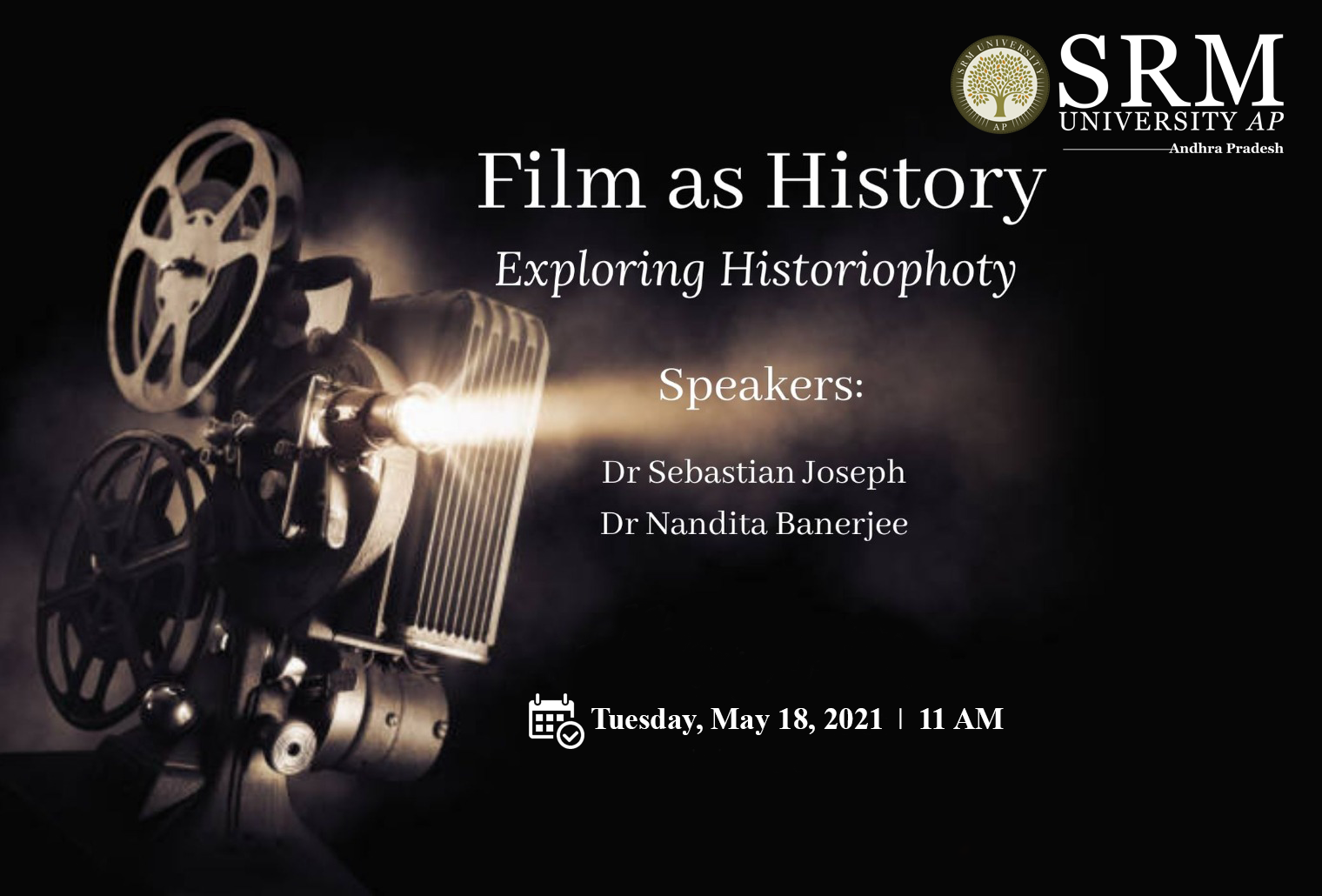 A webinar aimed to discuss the use of films in particular and visual images in general as sources for the reconstruction of History was organized by the Department of History on May 18, 2021. Films as History; Exploring Historiophoty, the first of the monthly Webinar series on new and exploratory themes in History, dealt with the promises and challenges of Historiophoty as a sub-stream of history. Following Hayden White’s pathbreaking analysis of visual imagery and its location in historiography, historiophoty has emerged as a most promising pathway for historians particularly as we move towards a rapidly digitizing world.
A webinar aimed to discuss the use of films in particular and visual images in general as sources for the reconstruction of History was organized by the Department of History on May 18, 2021. Films as History; Exploring Historiophoty, the first of the monthly Webinar series on new and exploratory themes in History, dealt with the promises and challenges of Historiophoty as a sub-stream of history. Following Hayden White’s pathbreaking analysis of visual imagery and its location in historiography, historiophoty has emerged as a most promising pathway for historians particularly as we move towards a rapidly digitizing world.Dr Sebastian Joseph, a Historian and Film Critic and recipient of the State Award for Best work on Film History 2020, and the author of Cochin Forests and British Techno-ecological Imperialism in India addressed the first part of the webinar. He compared the textual and cinematic representations of history through the lens of the Historian Robert Rosenstone, who divided the plot of a film into three parts: beginning, middle, and end. Dr Joseph conveyed his knowledge of history and cinema through six distinct characteristics put forth by Rosenstone.
(i) A distinction was made between textual and cinematic representations of history, with the latter presenting problematic and conceptual history in a narrative format for better comprehension. (ii) Cinematic representations of history resemble personal narratives more than historical narratives. The straightforward narrative representation aims to communicate and establish an immediate connection with the audiences behind the cinema screens. (iii) The storyline narrated in historical cinematic representations must have a satisfactory conclusion. Historical representations of films dramatize, personalize, and emotionalize, whereas textual history critiques the emotional aspects, as they can invalidate the credibility of the sources. (iv) Film adds to the overall emotional experience of viewers by using music, sound effects, dialogue, and so on. Dr Joseph deduced from Rosenstone’s fifth and sixth characteristics that the historical depictions in cinema are fictional and reflect the socioeconomic and political conditions of society. At the end of the session, he postulated that “there is a tale behind every story, and there is no way that we can look at films as secondary sources of history, but as the primary source for history and historical explanations.”
Dr Nandita Banerjee, Associate Professor at Sidho-Kanho-Birsha University, West Bengal delivered the keynote address during the second half of the webinar. Dr Banerjee provided a critical analysis of the evolution of traditional art and visual images into digitised form. Historians observed the live depiction of civil wars, conflicts, and protests through the documentation captured on camera footage. Visual evidence such as photographs and records are authentic sources and history would be incomplete without them. She further added that “Learning from history is never a one-way street, and learning about the present in light of the past entails learning about the past in light of the present. History is the in-depth study of the past and present. Images, according to some world historians, are the established method of remembering the past. Since the dawn of human evolution, the visual image has served as a representation of social memories in art. ” She validated her perspective by citing the German war and the Vietnamese conflict, both of which are visible in world history because of visual and oral footage. Dr Banerjee also discussed the enormous influence visual images on audiences and the place it marks in the worlds of film and history.
The webinar came to an apprising close with a panel discussion followed by a Q&A session.
Pre-Event Release: https://srmap.edu.in/events/films-as-history-exploring-historiophoty/
Continue reading → - Let Passion Drive our Profession June 4, 2021
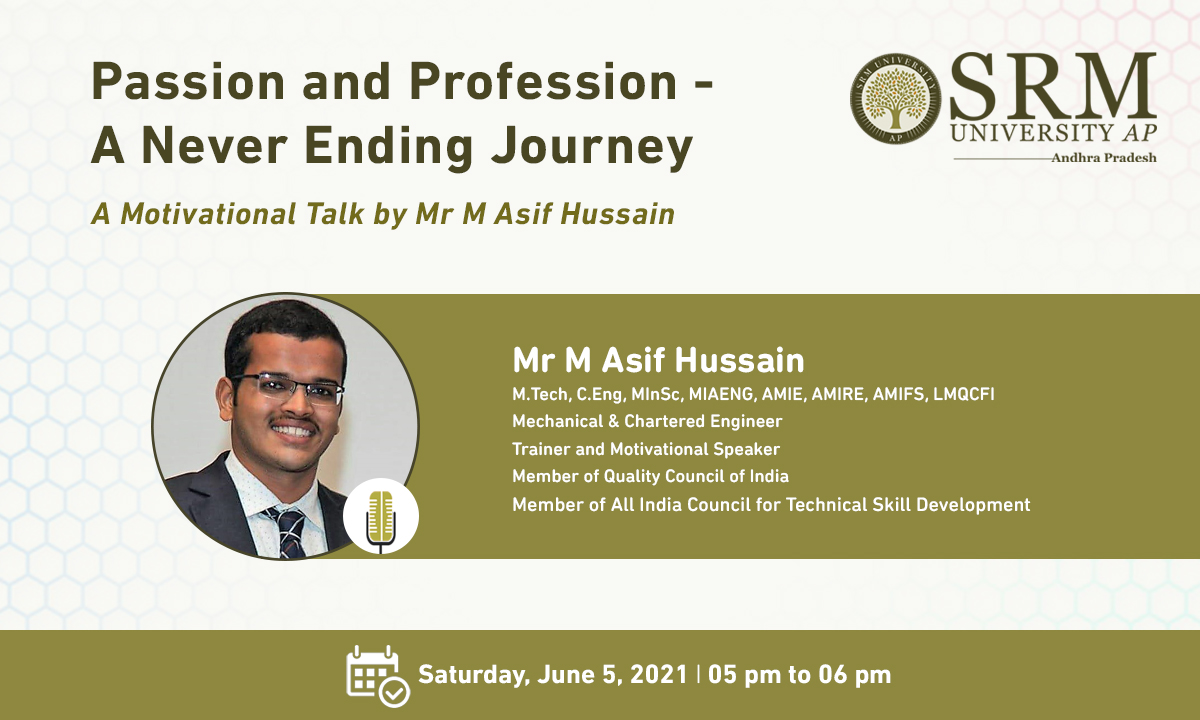 “All our dreams can come true if we have the courage to pursue them”, said Walt Disney, a pioneer of the American animation industry. Oftentimes we need a push forward to achieve our dreams and aspirations. A smart person is willing to listen, learn and respond efficiently to succeed in all aspects of their life. Mr Muddubhai Asif Hussain is such a young and vibrant personality who set foot in diverse professional arenas and achieved enviable success. Department of Student Affairs has scheduled an interactive motivational session with Mr Hussain on the topic “Passion and Profession-A Never Ending Journey” on June 5, 2021, at 5.00 pm for the students of our university. All students are invited to benefit from this worthwhile session. Let us Dream High, Stay Humble and Achieve Success.
“All our dreams can come true if we have the courage to pursue them”, said Walt Disney, a pioneer of the American animation industry. Oftentimes we need a push forward to achieve our dreams and aspirations. A smart person is willing to listen, learn and respond efficiently to succeed in all aspects of their life. Mr Muddubhai Asif Hussain is such a young and vibrant personality who set foot in diverse professional arenas and achieved enviable success. Department of Student Affairs has scheduled an interactive motivational session with Mr Hussain on the topic “Passion and Profession-A Never Ending Journey” on June 5, 2021, at 5.00 pm for the students of our university. All students are invited to benefit from this worthwhile session. Let us Dream High, Stay Humble and Achieve Success.About the Speaker: Mr Muddubhai Asif Hussain has been the District President of National Youth Council of India, District Advisor for World Human Rights Council, and a recipient of ‘InSc Young Achiever Award 2020’ from Institute of Scholars, Bangalore. A mechanical engineer by profession, Mr Hussain is building his prowess and passion as a Chartered Engineer, Social Activist, Philanthropist, Political Consultant, Strategic Planner, expert in Campaign Management, an Orator and a Motivational Speaker.
Continue reading → - Renowned physicists deliver talks at the “One-Day National Symposium on High Energy Physics.” June 4, 2021
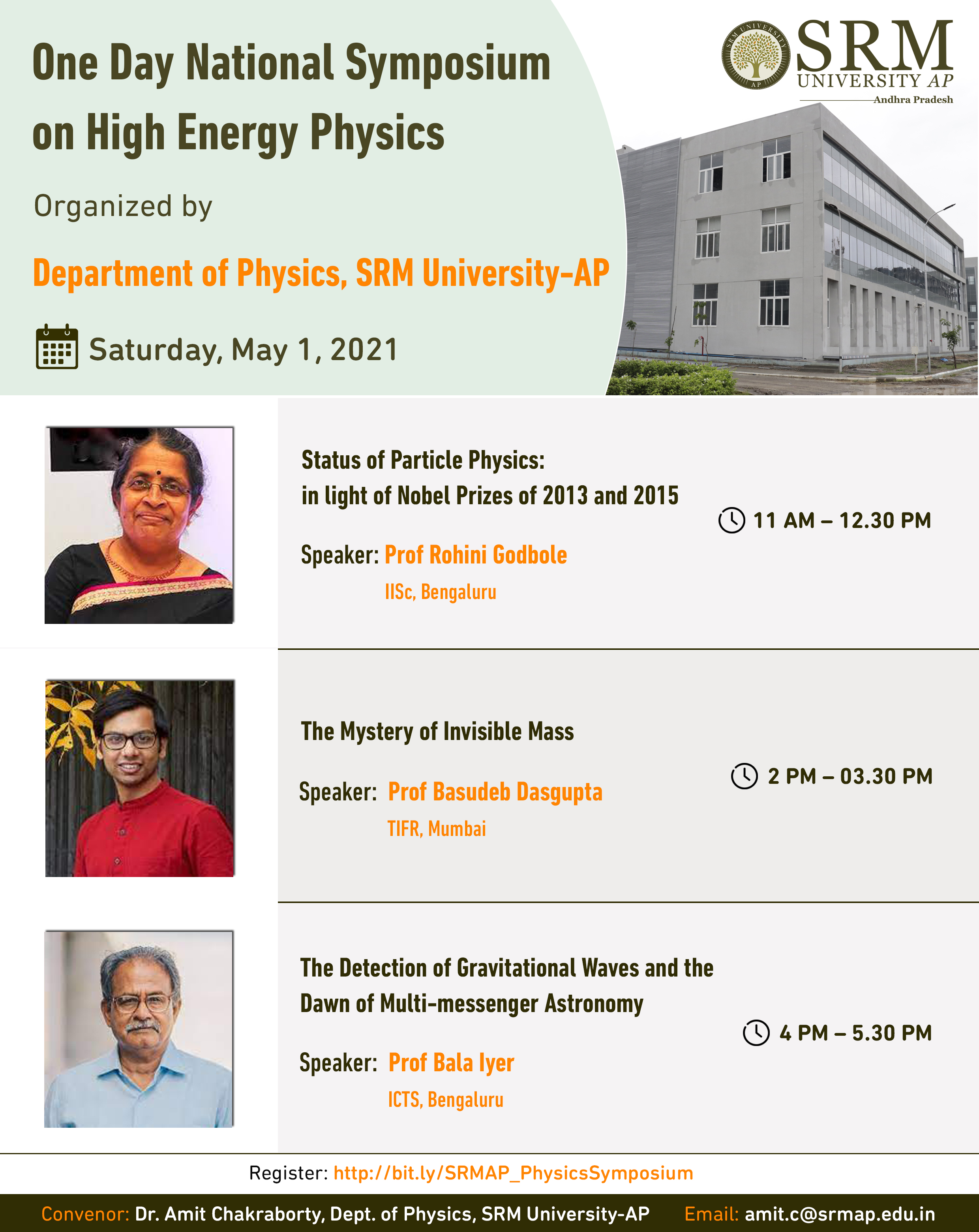 The Department of Physics, SRM University-AP organized a “One-day National Symposium on High Energy Physics” on Saturday, May 1, 2021. The session was held through online mode in the presence of honourable leaders of the university, faculty members, and attendees from various fields of interest. Prof V S Rao, the Vice-Chancellor, SRM University-AP, welcomed the gathering with a brief overview of the university’s inception and quick progress in the field of research.
The Department of Physics, SRM University-AP organized a “One-day National Symposium on High Energy Physics” on Saturday, May 1, 2021. The session was held through online mode in the presence of honourable leaders of the university, faculty members, and attendees from various fields of interest. Prof V S Rao, the Vice-Chancellor, SRM University-AP, welcomed the gathering with a brief overview of the university’s inception and quick progress in the field of research. Three talks at the pedagogical level were organised for a wider audience, especially for the students of basic sciences and engineering streams. The first speaker, a Padma Shri awardee, Prof Rohini Godbole, who is a theoretical particle physicist at Indian Institute of Science (IISc), Bengaluru expounded on “Status of Particle Physics: in light of Nobel Prizes of 2013 and 2015”. She talked about the Higgs Boson’s theoretical postulate, for which the Nobel Prize in Physics was granted in 2013. According to studies, it was the final missing element in the Standard Model’s periodic table (SM). Her paper incorporated the experimental finding of the Neutrino Oscillation, as well as many compelling pieces of evidence that led to the 2015 Nobel Prize.
In the afternoon session, the talks were on the burgeoning field of Dark Matter physics and Gravitational-wave astronomy. Prof Basudeb Dasgupta from Tata Institute of Fundamental Research (TIFR), Mumbai apprised the participants on “The Mystery of Invisible Mass”. The deep understanding and expertise of Prof Dasgupta in the interfaces of particle physics, astrophysics, and cosmology with a particular emphasis on dark matter and neutrino physics as a theoretical physicist at the Tata Institue of Fundamental Research (TIFR) enlightened the audience. He stated that the human beings are able to see only 20% of the universe’s celestial objects; the remaining 80% are unseen and are referred to as “dark matter.” In his words, “Billions of years after the Big Bang, all we can see is the cloud’s surface, where the light is scattered.” Prof Basudeb, is a frequent speaker at prestigious international and national conferences and is a youth icon for aspiring physicists and scientists.
The final lecture of the day was delivered by Prof Bala Iyer from International Centre for Theoretical Sciences (ICTS), Bengaluru on “The Detection of Gravitational Waves and the Dawn of Multi-messenger Astronomy” at 4.00 pm. Prof Iyer is currently the Simons Visiting Professor at ICTS-TIFR Bangalore and co-PI of the LIGO-India Scientific Collaboration. He coaches and guides young minds interested in astrophysics, cosmology, and fundamental physics. Prof Iyer did a presentation on the discovery of gravitational waves from a binary black hole in 2015, which was a watershed moment and necessitated the launch of a new multi-messenger astronomy with the potential to have a significant impact on astrophysics. “Any relativistic theory of gravity must be consistent with the special relativity principle. Gravity’s effect cannot travel faster than the speed of light. If an item’s gravitational field changes, the changes propagate over space and take a certain amount of time to reach the object “, he added.
The symposium that aimed to discuss the current status of exciting research topics of High Energy Physics concluded with a Q&A session. This has proved that the faculty members and participants were highly inspired and motivated after attending the symposium and listening to the scholars.
Pre-Event Release: https://srmap.edu.in/events/national-symposium-on-high-energy-physics-2021/
Continue reading → - 3rd Year EEE Student Selected for Prestigious “INAE – Engineering Student Mentoring Programme” June 4, 2021
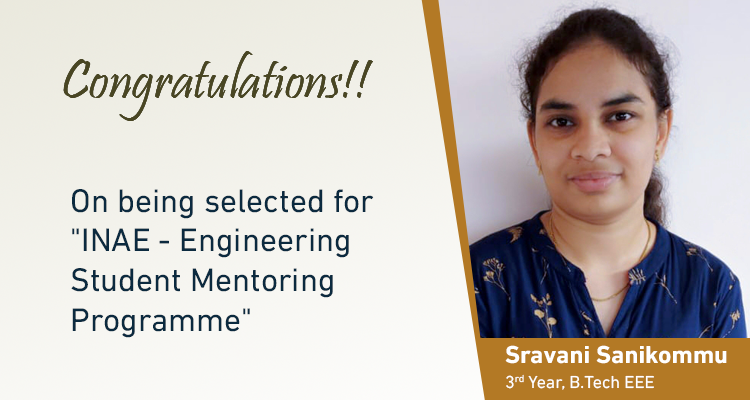 Ms Sravani Sanikommu, a vibrant and keen third-year Electrical and Electronics Engineering (EEE) student from SRM University-AP, has been selected for the prestigious Mentoring of Engineering Students by INAE Fellows Programme by the Governing Council of Indian National Academy of Engineering (INAE). She is one amongst 59 brilliant students who have been selected from across the country this year. The objective of this distinguished programme is to mentor outstanding B.E/BTech undergraduates by INAE fellows. Meritorious 3rd /4th year B.E./B. Tech students from recognised Engineering institutions are eligible under the scheme. Candidates must have a minimum of 75% or a CGPA of 7.5 to be considered for this programme. The mentorship program takes place through an online medium.
Ms Sravani Sanikommu, a vibrant and keen third-year Electrical and Electronics Engineering (EEE) student from SRM University-AP, has been selected for the prestigious Mentoring of Engineering Students by INAE Fellows Programme by the Governing Council of Indian National Academy of Engineering (INAE). She is one amongst 59 brilliant students who have been selected from across the country this year. The objective of this distinguished programme is to mentor outstanding B.E/BTech undergraduates by INAE fellows. Meritorious 3rd /4th year B.E./B. Tech students from recognised Engineering institutions are eligible under the scheme. Candidates must have a minimum of 75% or a CGPA of 7.5 to be considered for this programme. The mentorship program takes place through an online medium.The Governing Council of the Indian National Academy of Engineers (INAE) designed the mentoring programme to encourage future engineers in the nation to make significant contributions to engineering and technology for holistic solutions. Due to COVID-19 pandemic, online internship is also available. Ms Sravani gets an opportunity to work online in the host institution in the field of power electronics under the able mentorship of INAE Fellow Prof B G Fernandes, Electrical Engineering, Indian Institute of Technology Bombay (https://www.ee.iitb.ac.in/wiki/faculty/bgf) for 2 Months. She extended her gratitude to Dr Tousif Khan N, the Head of the Department, and Prof Sastry V Vedula, a distinguished visiting professor in the Department of Electrical and Electronics Engineering, as well as an INAE fellow, for initiating her into the mentoring programme and providing constant guidance.
Sravani stated that she had complete supervision of faculty members of SRM-AP during the preparation for this two month Mentoring Programme. The extensive research expertise of faculty members aided significantly throughout the selection process among the finest applicants. “I thank everybody who has put efforts into making this happen. SRMAP can provide such amazing opportunities to research in the fields in which students are interested in working. This is made possible through the faculty members who are experienced in the specified fields which helps the students to learn more about the subject and form a substantial idea on how the concepts work. If somebody is keenly interested in research on something they love and are very passionate about it, SRMAP is the right place!!”, said Ms Sravani with overwhelming enthusiasm.
Continue reading →


